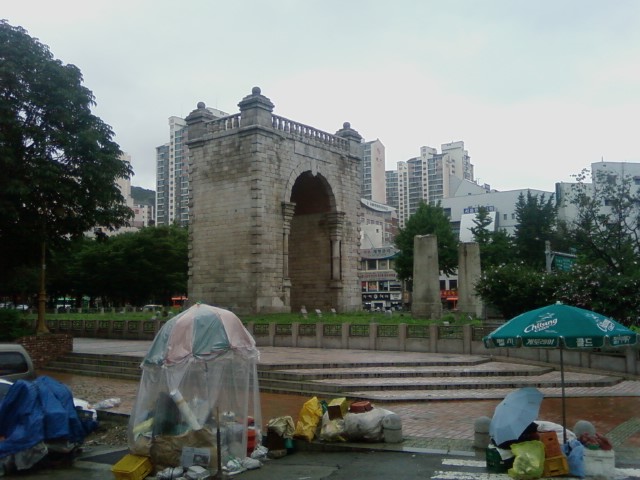I was riding the subway, and looking at a newspaper over a man’s shoulder. There was a big headline, that read “빌코멘 오바마” (bil-ko-men o-ba-ma). And there was a picture above the headline, that definitely gave away the second word – it was a certain popular American politician. The first word took a few more seconds to puzzle out. But I’ll give a clue – that certain American politician was giving a speech in Germany. So, I’ll let you polyglots out there decipher what that first word is – it’s not Korean.
I decided to do some random exploring. I got off the subway at 독립문 (Dongnimmun). I wandered around the neighborhood, with a vague idea of trying to go up over the mountain to the southwest, toward Sinchon past the Geumhwa tunnel, but the moutain didn’t appear to have footpaths over it – at least not from where I went.

One odd thing I noticed was when I looked up at the Independence Gate (which is what 독립문=Dongnimmun means), and I saw written there, very clearly, 문립독=Munipdok… which is to say, the three hangeul glyphs are in reverse order! Why does the gate have its name written backwards, on it? I have two speculations. First, it’s because I was looking “out of” the gate – I was standing to the east of it, meaning closer to downtown, and the gate was on the western side of the old city, so, the side I was looking at was the “inside.” So maybe the name was written backwards to match up with what was written on the other side? The other speculation is that maybe it has to do with Chinese word order? I couldn’t find a solution to the mystery through any googlings. Anyway, I took a picture of the gate, but the backward hangeul at the top of the arch doesn’t show up very well – the resolution wasn’t good enough on my phone’s camera, I guess.
I got on a bus randomly, and it did in fact take me toward Sinchon. But in the meantime I’d lost interest in trying to get to Sinchon, and had become fixated on making my weekly visit to a major bookstore. So I got off the bus when I saw a station on the number 5 subway line, and rode it two stops to Gwanghwamun, where there’s a big Kyobo bookstore. Too big – I like the one in Gangnam better. This one was a freakin zoo, it was so crowded. Maybe it was because of the rain. I bought a few magazines and one book, and left much more quickly than I normally do.
I have spent some time messing around on naver.com, trying to become more comfortable and proficient navigating the internet in Korean. I found a great posting (in English) that someone did on the basics of how to use naver.com, Korea’s number one internet portal. In any event, I can now proudly say that I have a Korean email address – to go with all my other email addresses! It is jaredway [at] naver.com.
-Notes for Korean-
context: surfing naver.com
만들다=make, create, so… 만들기=[a button on a website, “create!”]
…and therefore, “하느님께서 태초에 천지를 만드셨다” “in the beginning, God created heaven and earth.”
On seeing this, I got curious about the Korean word for God. There are two words which have different origins but are (in)conveniently quite similar in pronunciation (which creates confusion and/or clarity depending on one’s attitude towards semantic ambiguity, right?):
하느님(haneunim)=god as a traditional “lord in heaven” and mentioned even in pre-Christian Korean literature, and, e.g., the Korean national anthem. It comes from 하늘(haneul)=heaven, sky… hence, “sky guy [honorific]”
하나님(hananim)=a capitalized, monotheistic God, “number one guy [honorific]”
…
성격=personality, type
열린=open, unlocked
닫힌=closed… from 닫히다=close, shut
숨은=hidden… from 숨다=hide
…
분류=classification
생활=livelihood, lifestyle
생활하다=live, subsist
-점(店)=a store;a shop
![]()
